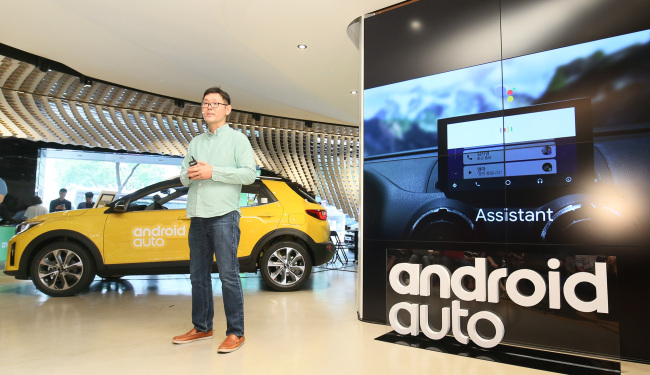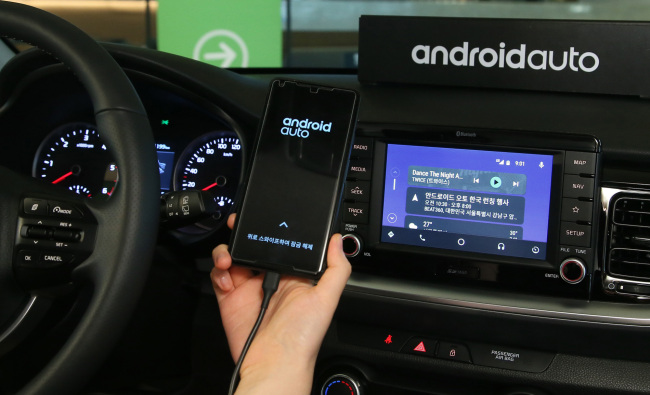Google finally brings Android Auto to Korea with Kakao, Hyundai Motor
Korean version of Google’s in-car infotainment app now available in Hyundai, Kia vehicles sold here, three years since its US launch in 2015
By Sohn Ji-youngPublished : July 12, 2018 - 15:40
Google on Thursday announced the formal launch of its in-car infotainment application Android Auto in South Korea, brought in partnership with local mobile messaging giant Kakao and Hyundai Motor Group.
Arriving in Korea three years later than other markets, Android Auto is an in-car infotainment system that brings features available on Android smartphones -- such as navigation, calling, music and mobile messaging -- into a car’s dashboard in an optimized format.
The Korean version of Android Auto is also powered by the voice-activated AI platform Google Assistant, enabling drivers to access the features via voice commands and keep their eyes on the road, the company said.
Arriving in Korea three years later than other markets, Android Auto is an in-car infotainment system that brings features available on Android smartphones -- such as navigation, calling, music and mobile messaging -- into a car’s dashboard in an optimized format.
The Korean version of Android Auto is also powered by the voice-activated AI platform Google Assistant, enabling drivers to access the features via voice commands and keep their eyes on the road, the company said.
To connect, drivers can plug the device to the car via a USB cable. Drivers can either use the touchscreen or simply speak their commands out loud. It functions similarly to Apple’s connected-car app CarPlay.
In Korea, the Android Auto app is available on all vehicles sold here by Hyundai Motor and Kia Motors. For now, this will be the only way to access Android Auto in Korea, as Google has yet to locally release a standalone version of the Android Auto app that can function on any smartphone.
“Hyundai and Kia vehicles were the first to adopt Android Auto when it was first launched (in 2015). And now the app has finally arrived in Hyundai’s home turf,” Lawrence Kim, Android Auto lead product manager at Google, said during the Android Auto launch event held Thursday in Seoul.
“Android is also the dominant operating system used in Korea. Together, these two points make the Korean launch of Android Auto all the more meaningful,” Kim said.

Despite the market opportunities, Google waited three years to launch Android Auto in Korea, while introducing the app in the US and other global markets in 2015. At issue for Google was Google Maps, whose Korean version is missing features such as turn-by-turn navigation services, due to unresolved regulatory issues.
The Korean government prohibits high-precision maps from being taken out of the country, due to security concerns. Korea has insisted that Google can take map data out of the country only if it deletes security-sensitive sites like government buildings and military bases. But the US tech giant has continued to refuse, leading to an impasse.
As the situation remains unchanged, Google now seems to have made a rare decision to bring in navigation services developed by a third-party player, in place of Google Maps.
The Korean version of Android Auto by default operates on Kakao’s navigation app KakaoNavi. Users also have the option of downloading the open map navigation app Waze, which is also compatible with Android Auto.
KakaoNavi is the only third-party navigation system to be integrated into Android Auto, other than the open source map application Waze, said Kim, adding that Google has no immediate plans to integrate additional external navigation maps into Android Auto.

The arrival of Android Auto to Korea is slated to heat up competition in the local car-infotainment business landscape, where Korean internet technology companies have also been active.
Naver, which dominates Korea’ internet landscape with its portal website Naver, introduced its in-vehicle infotainment system Away last year. Similar moves were made by Kakao, which has brought its artificially intelligent voice recognition platform Kakao I into Hyundai and Kia vehicles.
In-vehicle infotainment refers to a collection of hardware and software in automobiles that deliver audio and video entertainment as well as meet communication needs inside cars. It is viewed as an integral component of connected cars and autonomous cars, and a technology expected to reshape future driving.
By Sohn Ji-young (jys@heraldcorp.com)








![[Graphic News] More Koreans say they plan long-distance trips this year](http://res.heraldm.com/phpwas/restmb_idxmake.php?idx=644&simg=/content/image/2024/04/17/20240417050828_0.gif&u=)
![[KH Explains] Hyundai's full hybrid edge to pay off amid slow transition to pure EVs](http://res.heraldm.com/phpwas/restmb_idxmake.php?idx=644&simg=/content/image/2024/04/18/20240418050645_0.jpg&u=20240419100350)







![[KH Explains] Hyundai's full hybrid edge to pay off amid slow transition to pure EVs](http://res.heraldm.com/phpwas/restmb_idxmake.php?idx=652&simg=/content/image/2024/04/18/20240418050645_0.jpg&u=20240419100350)

![[Today’s K-pop] Illit drops debut single remix](http://res.heraldm.com/phpwas/restmb_idxmake.php?idx=642&simg=/content/image/2024/04/19/20240419050612_0.jpg&u=)